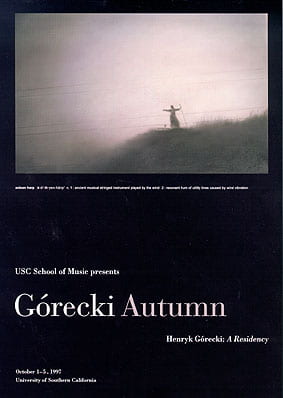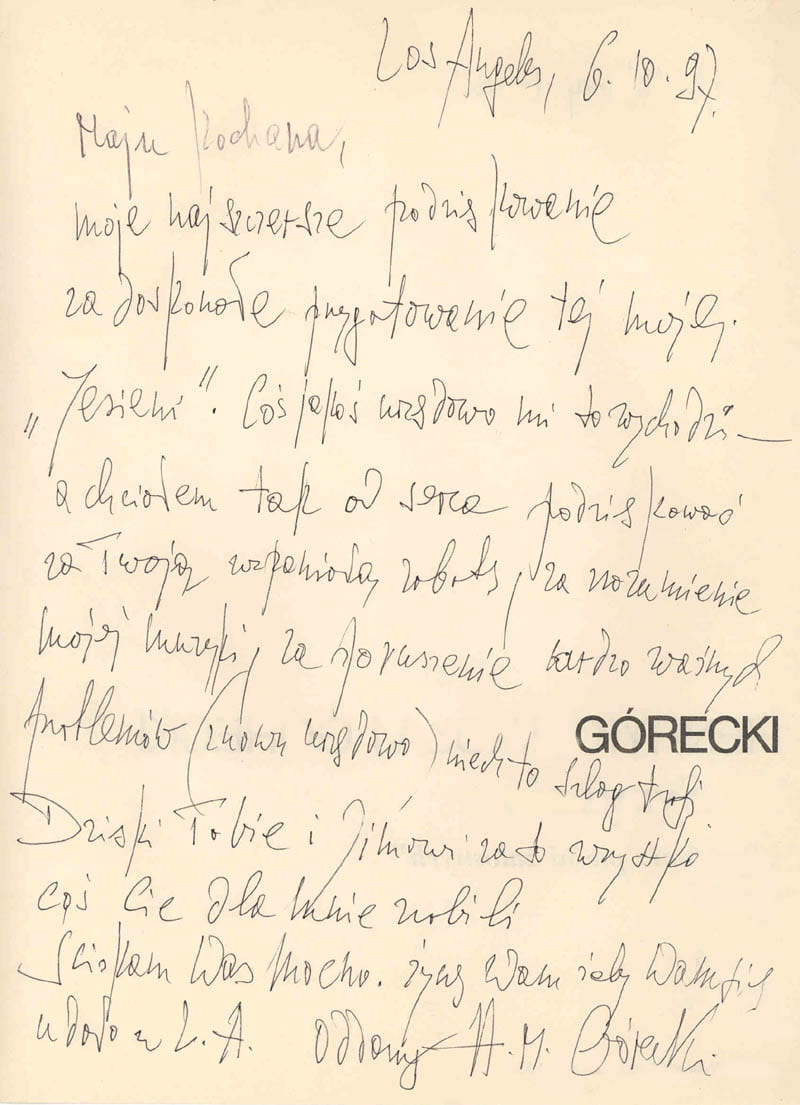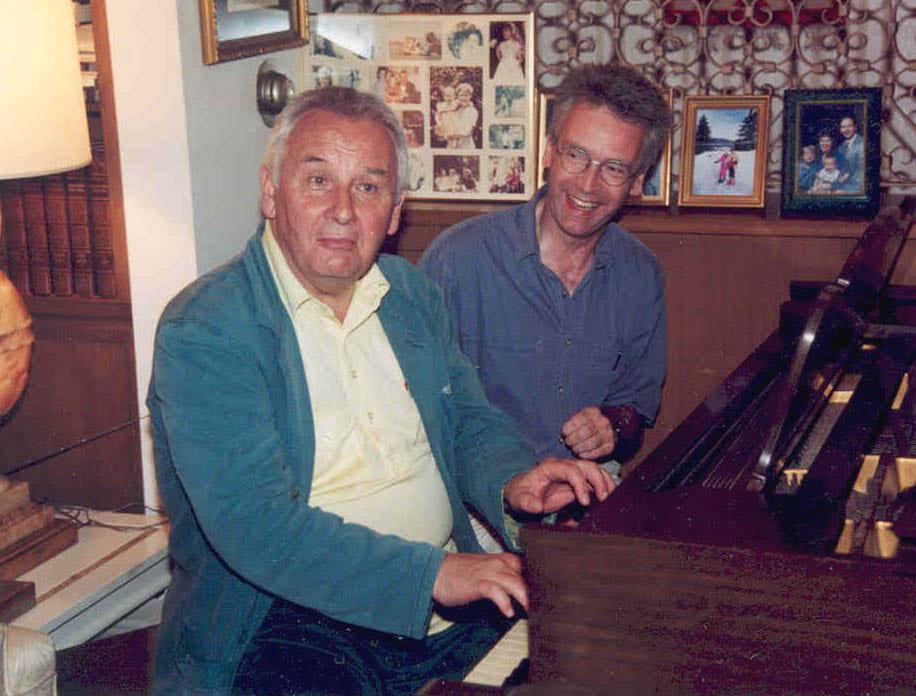Henryk Mikołaj Górecki at 70
Editorial by Maja Trochimczyk

Composing is a terribly personal matter: the overcoming of difficulties, gaining knowledge, deciding upon a certain order, a certain method of constructing a new piece. This is important. You have to chose your way, you have to pick a proper path from an infinite number of possibilities. [Henryk Mikołaj Górecki in an interview with Maja Trochimczyk, 1998] [1]
Henryk Mikołaj Górecki’s seventieth birthday has provided an occasion for numerous celebrations in Poland, though it has been marked with fewer international events than could have been expected on the basis of his rapid rise to fame in the 1990s. In the past four years, his British publisher, Boosey & Hawkes, featured only three news items about the composer, noting the premiere of a cantata dedicated to St. Adalbert, Salve Sidus Polonorum, at Expo 2000 in Germany, Mats Ek’s ballet to Górecki’s music (2001), and new Kurpian Songs for choir a capella (September 2003).[2]The premiere of the Kurpian Songs, Op. 75 (1999) took place on 30 March 2003, during a gala tribute concert dedicated to the composer at the Polish Radio in Warsaw. Other Polish tributes included: the opening concert of the Warsaw Autumn Festival (with Canticum Graduum, September), the Seventh Festival of Contemporary Music in Bielsko-Biała, where Górecki was the featured composer (October), “Henryk Mikołaj Górecki’s Jubilee” in Kraków (November), and the “Górecki Marathon” on 6 December 2003 in Katowice, a festival of eighteen concerts presenting most of the composer’s music on his birthday. Anniversary celebrations were also marked in Kalisz, Łódź, Bydgoszcz, Poznań and Warsaw.[3]The only monographic concert abroad, held at the Vatican at the end of October, was actually given by a Polish orchestra, conducted by Gabriel Chmura. The program included Three Dances for orchestra, Harpsichord Concerto and the Symphony No. 3, Symphony of Sorrowful Songs, with Zofia Kilanowicz (soprano).
It is worth noting that the same Symphony of Sorrowful Songs that firmly inscribed Górecki’s name in the awareness of music lovers around the world was performed during the only anniversary concert dedicated to his music outside of Poland. In some ways, this Symphony remains a “watershed” work in his career; a work greeted with international furore of unprecedented proportions, a work loved or hated by critics, scholars, and musicians, a work admired by countless listeners around the world. The 1997 American premiere of this Symphony, given by USC student orchestra under Górecki’s baton was a unique event, a centerpiece in the Górecki Autumn Festival organized at the University of Southern California by the Polish Music Reference Center. As the Center’s director and the Festival’s organizer I surrounded this one-of-a-kind performance with a range of events: a scholarly symposium, two chamber concerts, and Górecki’s meetings with students and music lovers. The “Górecki conducts Górecki” concert was ecstatically reviewed by numerous newspapers and periodicals: Los Angeles Times, Los Angeles Weekly, American Record Guide, L.A. Downtown News, Ruch Muzyczny, Nowy Dziennik, 20th-Century Music, Musicworks, Tempo, News of Polonia, Voice of Polonia, and others, including Korean and Japanese papers. In December 1997 the Górecki Autumn was recognized among ten best events of the year by the L.A. Times (listed at first place) and L.A. Downtown News.[4] At the end of his visit to Los Angeles, the composer wrote a thank-you note for me and my (now ex)-husband, on the frontispiece of the score of his Symphony No. 3. By reprinting it here, I will best give an expression to both the idiosyncrasies of Górecki’s warm, yet perplexing personality, and the inexorable flow of time:
Los Angeles, 6.10.97
My Dearest Maja,
I offer you my most sincere thanks for the perfect preparation of this, my “Autumn.” – It turns out to be too official somehow – but I want to thank you so sincerely, from the heart, for all your wonderful work, for the understanding of my music, for touching upon extremely important problems (again too official, damn it). I thank you and I thank Jim for all that you have done for me.With hugs and best wishes that both of you will “make it” in L.A. Sincerely yours, H. M. Górecki.

Six years have passed since the composer wrote these words; six years separate the creation and publication of some of the essays gathered in the current volume. Why did it take so long? Plans changed several times, we had to, to paraphrase Górecki’s expression cited above, “pick a proper path from an infinite number of possibilities.” The idea of a book of Górecki Studies (also known as Górecki: An Autumn Portrait) was replaced by the special issue of an electronic publication, which could be disseminated faster and reach a larger audience than a book. The present issue of the Polish Music Journal, dedicated to Henryk Mikołaj Górecki on his seventieth birthday, brings papers from the 1997 symposium “The Górecki Phenomenon,” organized by Maja Trochimczyk (then known as Maria Anna Harley) and attended by Prof. Adrian Thomas (Cardiff University of Wales, Provost’s Distinguished Visiting Scholar at USC), David Kopplin (then DMA composition student at UCLA, now Assistant Professor of Composition at Pomona College), Luke B. Howard (then musicology graduate at the University of Michigan, now Associate Professor of Music at Brigham Young University), and James Harley (Canadian composer, now Assistant Professor at Minnesota State University, Moorhead). Texts by Kopplin, Howard and Thomas appear in the colloquial form in which they were presented at the conference. My own text is reprinted, with some revisions including a new title, from its publication in the Musical Quarterly; James Harley refused to grant permission to reprint his article on performance issues in Górecki’s music (originally written for “The Górecki Phenomenon” symposium at the 1997 Górecki Autumn at USC; published in Tempo, no. 211; with a correction letter in no. 212).
In addition, the volume gathers ephemeral material associated with the conference: the program book and a selection of Górecki’s speeches and conversations with USC students and press reviews. In order to round up the volume, an essay by Anna Maslowiec about early music of Górecki is reprinted from Australian musicology journal Contact and Martina Homma’s study of Górecki’s approach to formal archetypes and patterns is added to expand the theoretical side of Górecki studies. The updated bibliography is accompanied by two interviews with the composer: a reprint of Maslowiec’s translation of a 1962 conversation with Leon Markiewicz and a 1998 interview that I conducted during a visit to his studio in Katowice (now replaced by his new home in the village of Ząb, near Zakopane in the Tatra Mountains). A comparison of the range of topics in both interviews reveal how deeply “personal” was the shift in Górecki’s approach to composing.

Much has happened since Górecki Autumn. New discoveries have changed the perspective on “facts” we were almost certain about, such as the association of the Symphony No. 3 with the Holocaust, discussed by Luke Howard, among others. Thanks to the efforts of a British playwright Bob Bibby, we know that the young girl immortalized as a Nazi victim in the second movement of the Symphony of Sorrowful Songs actually survived the war to marry, have children, and die of old age in her hometown of Szczawnik.[5] Górecki continued composing slowly, with a healthy disregard for external pressures. Between 1997 (the year of Little Fantasia, Op. 73 for violin and piano) and 2002 (the year of Quasi una Fantasia for strings, based on String Quartet no. 2), he published only six opus numbers. He engaged himself in planning and sketching a cycle of religious cantatas dedicated to Polish saints, of which Salve Sidus Polonorum was the first. This work marked a definite change in Górecki’s approach to religious themes; after years of exploring the “via dolorosa” of suffering, he consciously strove to write a truly “blessed” and uplifting piece. In music, as in life, happiness is harder to find than suffering, and Salve Sidus Polonorum, though highly pleasing to its author, was welcomed with mixed critical responses. According to Andrew Clements’s review in The Guardian, the St. Adalbert cantata is “uncomplicated, designed to be emotionally direct, and almost liturgical in its intentions.” This clearly is not music for non-believers. The deepening of Górecki’s religious committment and the continuing fascination with Polish folklore reveal that the composer follows an individual path, rooted in the traditions of his home country. Does his music, by returning to its Polish roots and expressing a greater variety of religious sentiments, lose relevance for the outside world? Quite the opposite, though with its renewed simplicity it places more demands on its audiences.
Gathering material for this issue of the Polish Music Journal was possible thanks to the assistance of numerous individuals and institutions. I would like to express my gratitude to the following people and organizations for their role in bringing this project to completion: Henryk Mikołaj Górecki; Boosey and Hawkes Music Publishers; Susan Bamert of Boosey and Hawkes; PWM Polish Music Publishers; Chester Music; Dr. Larry Livingston, Dean of USC School of Music (till 2002); The Consulate General of the Republic of Poland; USC Provost Office; KUSC recording engineer Ted Ancona, who recorded the Symphony No. 3; Prof. Donal Crockett and the USC Contemporary Music Ensemble; Andrzej Bachleda; Wanda Wilk; Zbigniew Petrovich; USC music students Adrianna Lis, Blanka Sobuś, Marzena Wolny; journalists Danuta Derlinska-Pawlak, Mark Swed, Alan Rich; Los Angeles Times, Los Angeles Weekly, L.A. Downtown News, Nowy Dziennik, American Record Guide, Ruch Muzyczny, Nowy Dziennik, 20th Century Music, Tempo, News of Polonia, Voice of Polonia, Musicworks, Context, and The Musical Quarterly. I also owe a debt of gratitude to my editorial staff, especially Dr. Linda Schubert, Editor, and Krysta Close, Editorial Assistant. In the name of all of us, Górecki afficionados, I would like to end this editorial with simple wishes: “Happy Birthday!”
Notes
[1]. This interview, conducted in April 1998 in Katowice and entitled “‘Composing is a Terribly Personal Matter:’ Henryk Mikołaj Górecki in Conversation with Maja Trochimczyk,” appears in the “Documentation” segment of the present volume. [Back]
[2]. Information based on the web site of Boosey & Hawkes, www.boosey.com, “News” section, accessed on 30 November 2003. [Back]
[3]. Information based on the web site of PWM Edition (Polish Music Publishers), www.pwm.com.pl, accessed on 30 November 2003. [Back]
[4]. See excerpts from the reviews in the present volume. [Back]
[5]. Bibby’s one-hour play about her imprisonment, entitled Lena, was performed in March 2001 at a small theater in Bridgenorth, Shropshire, UK. See Polish Music Newsletter 8, no. 4 (April 2001), online. [Back]
[6]. Andrew Clements, Review of BBC Prom concert no. 38 (18 August 2001), The Guardian, 20 August 2001. [Back]